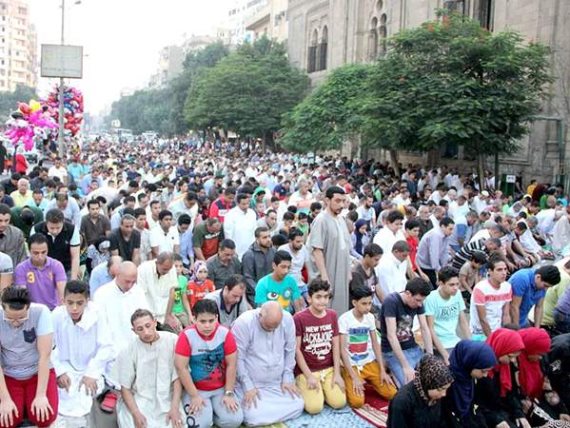With plunging consumption in media, tourism, food, entertainment and advertisement industries, traders and businessmen say that Ramadan’s upward spiral fell short of even beyond their most pessimistic predictions.
And they are not the only ones complaining. The poor and destitute complain that the money they usually receive in the fasting month in the form of zakat, Islamic almsgiving, has been either shrunk or has remained at previous levels although prices of different commodities were generally up in 2009.
“The economic crisis hit us hard and we expect a 25 per cent drop of sales this year compared to Ramadan 2008 despite the fact that the prices of some imported food staples such as rice and vegetable oils have decreased internationally,” says Moustafa el-Dhouwe, head of the grocery section at the Egyptian Chamber of Commerce.
Dhouwe adds that retailers were specifically affected by lower demand for Ramadan’s most traditional foodstuffs, such as Yameesh, a mixture of dried fruits like raisins, prunes, coconut and apricot. “Yameesh becomes a luxury, not a necessity as it used to be,” he says.
Rising international sugar prices added to the gloomy picture by pushing the oriental pastry business to cut its usual supplies during Ramadan.
“I used to sell more than 1000 boxes of kunafa and atayif daily in Ramadan, especially during the first two weeks of the month, but now if I manage to sell 700 boxes I consider it a success,” explains Saad Taha, a pastry shop owner in Hadayeq el-Qobba, a middle class neighborhood in Cairo. According to Taha, the price of one kilogram of sugar has increased from LE 2.75 in May to LE 4 in September.
A nearly three percent increase in food prices in August is a possible indicator that Egyptians have not spent substantially to make food items soar as they normally do before the beginning of the holy month.
The Central Agency for Public Mobilization and Statistics announced Wednesday that the index for urban inflation was 138.7 per cent in August compared to 136.6 per cent in July, a slower rate of increase than most experts predicted, especially considering that Egyptian families spend between 15 to 20 per cent of their annual food budget during Ramadan alone.
Television managers who thought that Ramadan, the highest season of viewership, would help restore the losses incurred due to the global recession might end up disappointed as well, say analysts.
Mohamed Ramadan, media director at Advantage Marketing, Egypt’s third largest advertising agency, believes that the majority of television stations obtained less than 50 per cent of the ad revenue this Ramadan than last year.
“With 60 serials on screen and huge accumulated losses, many television stations tried different strategies to attract advertisers such as offering free ad spots or cutting the cost of the 30-second ad,” Ramadan says.
He adds that the state-run television network, for example, cut the cost of the 30-second ad from LE 40,000 in 2008 to LE 25,000 this year in order to attract more advertisers. The problem, however, has been that the giant industries such as real estate, steel, and automotive refrained at large from spending on commercials.
“Like previous months, viewers have a lesser exposure to car or refrigerator ads because there is this conviction in the market that Egypt has not yet reached the peak of the crisis, so everybody especially within the strategic sector wants to keep his capital untouched by sparing the ad costs,” said Salah Elwi, public relations officer, at PromoSeven Ad.
Ramadan tents, once the main entertainment trademark of the fasting month, also seem unable to defy the economic downturn. Fewer tents were erected this month, with the majority of them hosting second-rate singers.
General Manager of Talent W.M, Waleed Mansour estimated a 10 per cent decline in Ramadan tent construction this year.
“To sustain our business, we had to sign up with semi-famous singers like Ramy Sabry and Hussam Habib because we couldn’t afford superstars like Amr Diab and Tamer Hosni who actually doubled their prices,” Egypt’s leading impresario said.
Even if Ramadan has gradually turned away from being a month of spiritual introspection and self-discipline due to the rising tides of commercialism and consumerism, Zakat has always remained the single act of manifesting social solidarity during the fasting month.
Some people, however, cast doubt whether this is still the case this Ramadan.
Salameh Abdel Razeq, a 41-year-old public transport bus driver, complains that he had hardly found Mawaed el-Rahman, the generous banquets that are organized by the well off to provide free breaking-of-the-fast meals for the poor during Ramadan.
“Whenever my shift ends before iftar (the meal which breaks the dusk-to-dawn fasting for Muslims) I used to go eat at any Rahman table to save some of my salary for my children. This year I can rarely find one,” says Abdelraziq who receives LE 500 monthly, placing him slightly outside the 40 per cent bulk of the population who live under the international poverty line.
The Egyptian government has restricted, sometimes actually banned, the mass feasts for the poor as a preventive measure to restrain the H1N1 virus.
Mamdouh Sha’aban, the general manager of Dar Al Orman, Egypt’s largest charity organization, has rather a different interpretation.
“I agree it’s a misfortune that some poor people couldn’t have access to free iftar for fear of spreading swine flu, but people have channeled their zakat through other venues such as charity organizations, orphanages and hospitals,” says Sha’aban.
Sha’aban also asserts that the financial crisis did not influence the size of zakat and donations his organization has received in 2009, including Ramadan itself.
“If a Muslim loses 20 or 30 per cent of his income, he’ll still pay the needy and the hungry his proper share,” he says.
Some observers, however, believe that there has been a reduction in the size of zakat and donations in the last couple years. A Nasser Social Bank official, who refused to be named, said that charity organizations obtained less donations and zakat recently due to various factors.
“More businessmen are considering building their own charities, others have abided by recent fatwas (religious edicts) which state that Muslims should only pay for the annual return of their assets rather than paying for the sum of their returns and assets together,” the official added.
Muslim scholars have been debated whether, for example, a person who has a LE 100,000 worth of asset on which he gets a return of LE 10,000 annually, should pay the 2.5 per cent zakat on the return only or on the entire LE 110,000.
Annual reports by Islamic banks in Egypt suggest that the sum of zakat paid by individuals has actually fallen in 2008.
According to the 2008 annual report by Faisal Islamic Bank, which is available on their website, the amount of zakat collected by individuals by the end of 2008 was LE 490,402, down 52 per cent from 2007.
The Egyptian Saudi Finance Bank provides similar findings. Its 2008 annual statement indicates that it received LE 1,500 by the end of 2008, down from LE 55,705 paid in 2007.
Features/Interviews




